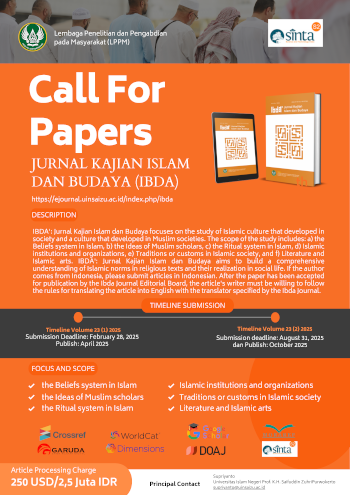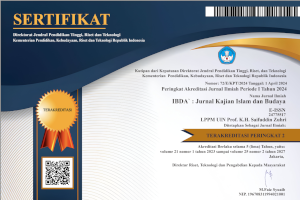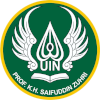IDEOLOGI PESANTREN SALAF: DERADIKALISASI AGAMA DAN BUDAYA DAMAI
DOI:
https://doi.org/10.24090/ibda.v12i2.446Keywords:
Ideologi, Pesantren Salaf, Deradikalisasi, Budaya DamaiAbstract
The emergence of a number of religious sects which culminated in violence, especially in Indonesia sometimes dragging the name of the salaf pesantren, is actually a phenomenon that is motivated by a number of determinant factors, such as economic factors, politics and ideology. For the first and second factor has been widely discussed by experts/ researchers, while the ideological factor often forgotten by many people. Whereas the issue of ideologythat believed by each religious groups usually determine their direction and purpose. In fact, sometimes leads to an attitude/decision how to look to other groups. The streams of radical ideology has encourages the hostility with the others. This phenomenon of course reversed with the mainstream ideology of pesantren salaf, one of which is a Pesantren Edimancoro Salatiga. as the result of research revealed that the idiology of this pesantren salaf, always talking mutualrespect and love for fellow human beings, voice for justice, liberation and against any anarchism is an enemy of every religion.Downloads
Download data is not yet available.
References
Afadlal, dkk. 2005. Islam dan Radikalisme. Jakarta: LIPI Press.
Clifford Geertz, 1997. The Interpretation of Cultures. New York: Basic Books. Inc.
Ismail, Faisal. 1997. Paradigma Kebudayaan Islam: Studi Kritis dan Refleksi Historis. Yogyakarta: Titian Ilahi Press.
Syuaibi, Gils Kibil Ali. 2004. Meluruskan Radikalisme Islam. Ciputat: Pustaka Azhary.
Nasution, Harun. 1995. Islam Rasional. Bandung: Mizan.
Sadily, Hasan (Pemred). 1984. Ensiklopedi Indonesia. Ikhtiar Baru –Van Hoeve.
Tim Penyusun. 1995. Kamus Besar Bahasa Indonesia. Jakarta: Balai Pustaka, Edisi Kedua.
Amstrong, Karen. 2005. “Islam: A short History†diterj. oleh Fungky Kusnaedy Timur. Yogyakarta: Jendela.
Khamami Zada, Islam Radikal, (Jakarta:Teraju, 2002), Cet. I.
Woodward, Mark R. 2012. Islam Jawa: Kesalehan Normatif versus Kebatinan. Yogyakarta: LKiS.
Marty, Martin E. 1992. “What is Fundamentalism? Theological Perspective†dalam Kung dan Moltmann (Eds), Fundamentalism as a Ecunemical Challenge London: tp.
van Bruinessen, Martin. 1995. Kitab Kuning Pesantren dan Tarekat. Bandung: Mizan.
Norman Markowitz, “Radical and Radicalisme†dalam (Dictionary of American History, 2003). http://www.encyclopedia.com.
Antoun, Ricard T. 2003. Memahami Fundamentalisme. Surabaya: Pustaka Eureka.
Zuhri, Saifudin. 1999. “Pendidikan Pesantren di Persimpangan Jalan†dalam Marzuki Wahid,dkk. Pesantren Masa Depan Wacana Pemberdayaan dan Transformasi Pesantren. Bandung: Pustaka Hidayah.
Syamsul Ma’arif. 2001. “Dinamika Pesantren Kontemporer†dalam Millah Jurnal Studi Agama, Vo. XI, No. 1, Agustus 2001. Yogyakarta: UII.
Thompson, J.B. 1990. Idiology and Modern Culture. California: Stanford University Press.
Watt, W.M. 1988. Islamic Fundamentalism and Modernity. London: Routledge.
William O. Beeman. 2001. “Fighting the Good Fight: Fundamentalism and Religion Revival†dalam J. MacClancy, Ed. 2001. Antropology for the Real World. Chicago: University of Chicago Press.
Yusuf, Choirul dan Suwito NS. 2009. Model Pengembangan Ekonomi Pesantren. Purwokerto: STAIN Press.
Clifford Geertz, 1997. The Interpretation of Cultures. New York: Basic Books. Inc.
Ismail, Faisal. 1997. Paradigma Kebudayaan Islam: Studi Kritis dan Refleksi Historis. Yogyakarta: Titian Ilahi Press.
Syuaibi, Gils Kibil Ali. 2004. Meluruskan Radikalisme Islam. Ciputat: Pustaka Azhary.
Nasution, Harun. 1995. Islam Rasional. Bandung: Mizan.
Sadily, Hasan (Pemred). 1984. Ensiklopedi Indonesia. Ikhtiar Baru –Van Hoeve.
Tim Penyusun. 1995. Kamus Besar Bahasa Indonesia. Jakarta: Balai Pustaka, Edisi Kedua.
Amstrong, Karen. 2005. “Islam: A short History†diterj. oleh Fungky Kusnaedy Timur. Yogyakarta: Jendela.
Khamami Zada, Islam Radikal, (Jakarta:Teraju, 2002), Cet. I.
Woodward, Mark R. 2012. Islam Jawa: Kesalehan Normatif versus Kebatinan. Yogyakarta: LKiS.
Marty, Martin E. 1992. “What is Fundamentalism? Theological Perspective†dalam Kung dan Moltmann (Eds), Fundamentalism as a Ecunemical Challenge London: tp.
van Bruinessen, Martin. 1995. Kitab Kuning Pesantren dan Tarekat. Bandung: Mizan.
Norman Markowitz, “Radical and Radicalisme†dalam (Dictionary of American History, 2003). http://www.encyclopedia.com.
Antoun, Ricard T. 2003. Memahami Fundamentalisme. Surabaya: Pustaka Eureka.
Zuhri, Saifudin. 1999. “Pendidikan Pesantren di Persimpangan Jalan†dalam Marzuki Wahid,dkk. Pesantren Masa Depan Wacana Pemberdayaan dan Transformasi Pesantren. Bandung: Pustaka Hidayah.
Syamsul Ma’arif. 2001. “Dinamika Pesantren Kontemporer†dalam Millah Jurnal Studi Agama, Vo. XI, No. 1, Agustus 2001. Yogyakarta: UII.
Thompson, J.B. 1990. Idiology and Modern Culture. California: Stanford University Press.
Watt, W.M. 1988. Islamic Fundamentalism and Modernity. London: Routledge.
William O. Beeman. 2001. “Fighting the Good Fight: Fundamentalism and Religion Revival†dalam J. MacClancy, Ed. 2001. Antropology for the Real World. Chicago: University of Chicago Press.
Yusuf, Choirul dan Suwito NS. 2009. Model Pengembangan Ekonomi Pesantren. Purwokerto: STAIN Press.
Downloads
How to Cite
Ma’arif, S. (2014). IDEOLOGI PESANTREN SALAF: DERADIKALISASI AGAMA DAN BUDAYA DAMAI. IBDA` : Jurnal Kajian Islam Dan Budaya, 12(2), 198–209. https://doi.org/10.24090/ibda.v12i2.446
Issue
Section
Articles
License
Authors who publish with this journal agree to the following terms:
- Authors retain copyright and grant the journal right of first publication with the work simultaneously licensed under a Creative Commons Attribution-ShareAlike License a that allows others to share the work with an acknowledgement of the work's authorship and initial publication in this journal.
- Authors are able to enter into separate, additional contractual arrangements for the non-exclusive distribution of the journal's published version of the work (e.g., post it to an institutional repository or publish it in a book), with an acknowledgment of its initial publication in this journal.
- Authors are permitted and encouraged to post their work online (e.g., in institutional repositories or on their website) before and during the submission process, as it can lead to productive exchanges, as well as earlier and greater citation of published work (See The Effect of Open Access).
















